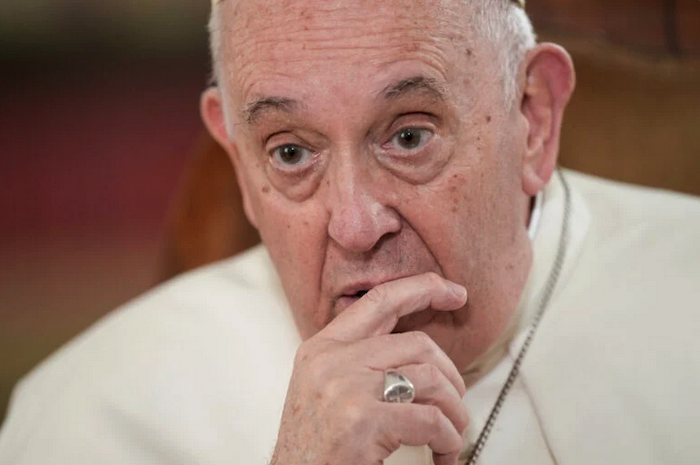— The relaxation of doctrine for pastoral purposes is itself a Christian doctrine. Is Pope Francis headed that way?

By Mark Silk
Pope Francis stirred the pot last week by calling for an end to criminal penalties for homosexuality. “Being gay is not a crime, it’s a human condition,” he told the AP in a wide-ranging interview in Spanish.
Harking back to his famous “Who am I to judge?” remark, Francis imagined an exchange with an objector:
We are all children of God and God loves us as we are and with the strength that each one of us fights for our dignity. Being homosexual is not a crime. It is not a crime.
Yes, but it’s a sin.
Well, first let’s distinguish sin from crime. But the lack of charity with the neighbor is also a sin, and how are you doing?
In other words, who are you to judge?
It’s possible Francis was sending a message to the bishops of Africa, where he is visiting this week and where 35 of the 54 countries have anti-gay criminal laws. Bishops who support such laws, he said in the interview, “have to have a process of conversion” and should apply “tenderness, please, as God has for each one of us.”
As has almost always been the case, Francis gave no indication that he intends to change church doctrine in order to advance his inclusive vision of the church. The sole exception has been his allowing (on a case-by-case basis) people who are divorced and remarried to have access to the Eucharist. The question is whether a similar opening might be made for those in same-sex unions.
According to the Catholic Catechism, while homosexual persons “must be accepted with respect, compassion, and sensitivity,” they are “called to chastity” — i.e. no licit sex for them. As for same-sex unions, the church will not bless them because, the Vatican declared two years ago, God “does not and cannot bless sin.”
Those teachings are likely to be up for discussion in the church-wide Synod on Synodality that will bring bishops to Rome for October sessions this year and next. Per the pope’s instructions, the preparations for it have entailed extensive consultations with ordinary Catholics.
Last September, the United States Conference of Catholic Bishops issued a report on the consultations that highlighted criticism of the church for not doing a better job of including those suffering from “the wound of marginalization.”
Among these are members of the LGBTQ+ community, persons who have been divorced or those who have remarried without a declaration of nullity, as well as individuals who have civilly married but who never married in the Church. Concerns about how to respond to the needs of these diverse groups surfaced in every synthesis.
In October, the Vatican issued a synthesis of reports from around the world that noted, “Issues such as the Church’s teaching on abortion, contraception, ordination of women, married clergy, celibacy, divorce and Holy Communion, homosexuality, LGBTQIA+ were raised up across the Dioceses both rural and urban.”
Last week, San Diego Bishop Robert McElroy, whom the pope made a cardinal last year, wrote an article in the Jesuit magazine “America” that openly questioned the exclusion of sexually active people who are not in what the church considers a legitimate marriage.
Calling such exclusion “pre-eminently a pastoral question, not a doctrinal one,” McElroy took direct aim at the church’s refusal to concede to gay people a right to same-sex sexual expression.
The distinction between orientation and activity cannot be the principal focus for such a pastoral embrace because it inevitably suggests dividing the L.G.B.T. community into those who refrain from sexual activity and those who do not. Rather, the dignity of every person as a child of God struggling in this world, and the loving outreach of God, must be the heart, soul, face and substance of the church’s stance and pastoral action.
“We must,” wrote McElroy, “examine the contradictions in a church of inclusion and shared belonging that have been identified by the voices of the people of God in our nation and discern in synodality a pathway for moving beyond them.”
It’s important to recognize that the relaxation of doctrine for pastoral purposes is itself a Christian doctrine — known in Eastern Orthodoxy as the principle of oikonomia. Based on the idea that in a fallen world there are circumstances that require doctrinal relaxation, the principle is employed within Orthodoxy, for example, to permit divorced people to be married in church a second and even a third time.
Under Francis, the synodal path appears to be leading in that direction. Whether it gets there is another question.
Complete Article ↪HERE↩!
